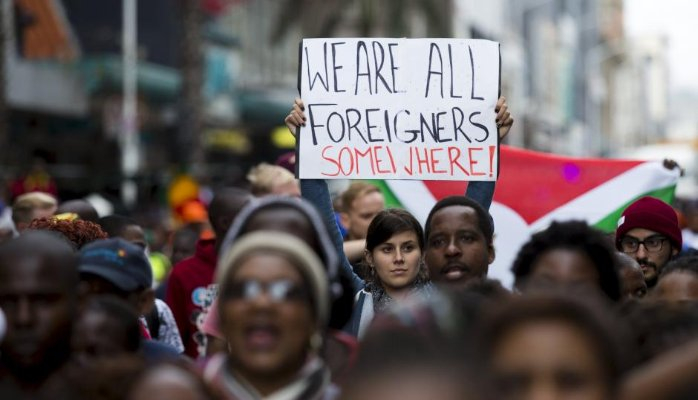A report by CTGN Africa news channel on protests in South Africa concerning tensions between citizens and foreign residents.
The report appears to be pretty fair and balanced. The theme involved is a familiar one. It is a global theme. We can observe the return of the xenophobic ghost in the news headlines from time to time and throughout history. Mostly if not always flared by politicians for political gain.
The xenophobia we currently experience is mostly based on either economical or ideological grounds:
- Foreigners taking away jobs from citizens
- Foreign ideologies i.e. religions are threatening the fabric of society
Recent events in the US, with the temporary ban on immigrants from certain Islamic countries. Political gains being made by right-wing politicians in Europe like Geert Wilders | NL and Marine Le Pen | FR. UK’s recent Brexit vote was also tied to issues on foreign influence and matters of immigration. And yes, even the recent upheaval in the US on the alleged influence of Russia on its elections. These are all examples whereby ‘fear of foreigners’ plays its part...
These are the symptoms, but not the cause. In my opinion, the root cause of xenophobia is inequality. An issue that is mentioned in the report, but not fully addressed. It is also often overlooked by news media in general and simply ignored in political debates.
In order to understand inequality, we have to step out of our bubble and be truthful to ourselves. Are we willing and able to accept less wealth and power for ourselves in order to share it with our less fortunate brethren and sisters across the globe? Thus enabling them to achieve their goals in life at our expense? What will this cost us and what are we to gain from it?
Inequality is a global theme, so is the solution.
Inequality is a multi-dimensional issue. A complex problem, but nevertheless let me try to break down some of its aspects.
‘Inequality’ is for one a monetary issue, the ones with a surplus of money vs. the ones that have too little to cover their basic daily needs. But it is a superficial argument, for it is the result of many underlying problems that are equated by the amount of money available. Money, wealth, currencies, are no more than accounting mechanisms. They are devoid of ideology or morals. Money is just money. We all need it in the global economic system we live under, but a dog wouldn’t eat from it...
‘inequality’ is for the most part ‘inequality of opportunity'.
‘inequality’ is for the most part ‘inequality of opportunity’. Geographical location, gender, social class are just a few parameters that determine the ability of a citizen of this world to achieve his or her goals in life. The pursuit of happiness, freedom, and justice for all.
Why are women still being paid less for the same work compared to men? On a global scale? Whether they live in Europe, Africa, or Asia?
Why does one's skin color, sexual preference, or religious beliefs matter when applying for a job? Again, this is not a local phenomenon. We can observe this across the globe.
Another type of ‘inequality is the ‘inequality of education’. Every citizen of the world, every child, no matter where should have (free) access to at least the most basic forms of education, in order to combat illiteracy and prepare an equal springboard for higher forms of education.
The ‘inequality of culture'
And what about the ‘inequality of culture’? Why is Western culture the globally predominant culture, considered to be superior to other cultures? Not only by Westerners but curiously enough by people of other cultures as well. I’m a Westerner, but I do not consider my culture to be superior. I’m not ashamed of it either, but can I see many flaws to it.
Consumerism, individualism i.e. egotism, has become part of Western culture and is detrimental to it. How can I truly be free when my next-door neighbor is not? How can I achieve my goals in life when my fellow human being is unable to do so? I cannot do it on my own. At a certain point, I have to cooperate with others to achieve mutual goals. Why should I be afraid that by enabling others I somehow would limit myself?
The world is getting smaller and smaller. The internet enables me to be informed on matters that go well beyond my geographical location. It enables me to comment and reflect on matters that occur on the other side of the globe. And yet I can do so, and I’m confident in doing so because the issues at hand are very similar to the issues I experience back home.
Shift the paradigm from ‘inequality’ to ‘interdependency’
What does or should this tell us? By erecting walls, either physical or mental, issuing immigration bans, deporting foreigners, and other xenophobic acts we will accomplish nothing.
In doing so we are just postponing the inevitable. The inevitable being: We are all related, interconnected, and interdependent to each other. We all are one. The sooner we face this fact and shift the paradigm from ‘inequality’ to ‘interdependency’, the better off we are.
The 'inequality of convenience'
If 'inequality' is the root cause of xenophobia then why aren't we confronted with it each and every day and not only when news hits the headlines? Well, for one it may be due to the way news media operates. More often than not news items are regurgitated from one news agency to another. Like cattle. One has to be like a lone wolf or lion to pick up the scent of the times that are changing.
Another aspect is more elusive. I would conclude that inequality is ever-present, ever so subtle, much like 'racism'. We won't notice it unless we are confronted with it.
And then there is the convenience aspect of 'inequality'. The ability to conveniently ignore the topic also depends on how much it impacts our daily lives. As long as we live within our comfort zone, our bubble, there's no apparent need for change. We can conveniently ignore the outside world and pretend it doesn't exist and is of no concern to us.
But this all dramatically changes once wars, terrorism, and the consequences thereof arrive at our doorstep and our bubble bursts. Hunger, refugees, diseases. All are consequences of 'inequality'. Matters of such urgency and importance we cannot conveniently shy away from.
Interdependency implies shared responsibility
If we want to move away from inequality to interdependency, then this implies we are equally responsible. No longer can one part of humanity act as the perpetrator and one as the victim. We are all in the same boat. The starship called 'planet Earth'. We are all passengers on the same journey.
We are interdependent not as a matter of choice but as a matter of fact. A fact we have to deal with one way or the other. Either nature and laws of nature overtake us or we start sharing our mutual responsibility as custodians of the beautiful planet we live on.

